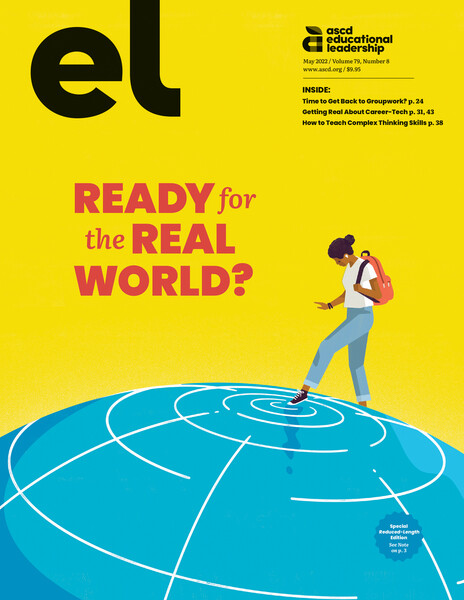Making Global Citizens
I work for Mizzou Academy, which is an online K–12 school through the College of Education and Human Development at the University of Missouri. We serve a large number of students attending school in Brazil. These students receive both a Brazil high school diploma and a Missouri high school diploma. Many of them are eager to continue their education in the United States after high school, so we help prepare them by offering a course called Career Planning. This course enables students from Brazil to learn more about life after high school in America. This is very important because it offers not only the expected information on jobs and attending a university, but also the cultural aspects, such as how the U.S. education system works and the challenges they might encounter when attending school or working in the American economy. We provide ideas and tips of how to overcome these challenges and be successful, whatever their goals may be. Globalization is increasing, and preparing students from different countries to learn and grow here benefits everyone.
—Kimberly Kester, lead teacher, Mizzou Academy, Columbia, Missouri
Oh, the Places We'll Go!
A goal this year at our school was to focus on graduating seniors and highlight the different directions that life can take. We wanted to promote all of the great things our students do and the opportunities that they make their own. Among the many projects were large student-created maps of Pennsylvania, the U.S., and the world that were displayed in the entrance of the main hallway. All seniors were asked to share where they had applied to go next year, and a pin was inserted in the map corresponding to that location. We wanted to hear from all students about their plans, whether for college, trade school, military, travel, or jobs. We wanted to show how far reaching Boyertown students could be.
We have students applying to the Culinary Institute of America in New York, the University of Hawaiʻi at Mānoa, the Great Lakes Naval Station, and jobs in Downingtown and Collegeville here in Pennsylvania. Information continues to be collected, and the map is updated monthly. One of the biggest surprises that has come out of the project is how it is already impacting underclassman. Students who had thought about staying local have found excitement and encouragement by looking at the map and seeing where our students could be. There has been an uptick in visits to the counseling office looking into out-of-state schools and military opportunities.
—Jamison Smerecki, instructional coach, Boyertown Area School District, Boyertown, Pennsylvania
Discovering What Isn't Your Calling
A week-long January term at Southside Christian School in Simpsonville, South Carolina, allows high school students to explore vocational calling through internships in a wide variety of local, regional, national, and international organizations. These are valuable not only in cementing a student's postsecondary choice of professions, but also in allowing students to realize the vocations they don't want to pursue. Several years of the interns' self-evaluations and internship supervisors' assessments give evidence of the January term internship methodology's impact.
—Bob Stouffer, high school principal, Southside Christian School, Simpsonville, South Carolina
The Far Reach of Critical Thinking
As a classroom teacher and chair for my English department, I have recently shifted my focus to preparing students for life after high school by helping them to develop critical thinking skills. Through literature, I help them acquire the skills that will be relevant beyond testing and certainly beyond high school. Students learn how to form judgements and engage in logically sound reasoning. I believe that even more important than filling their heads with facts and figures (because these are not constants anyway) is the need to equip students with skills that will enable them to successfully navigate our ever-changing world. I want my students to ask valid questions that challenge the status quo and deconstruct ideologies that marginalize others. I want them to become innovative and move our world into new and unexplored intellectual, technological, and scientific territories. Only critical thinking skills will enable students to reshape the world and truly be prepared for life beyond high school.
—Marsha Harvey, English teacher, Vance County Schools, Henderson, North Carolina
Let Them Steer Their Own Ship
During the summers of 2017 and 2018, a group of administrators and teachers at Holman Middle School attended professional development sessions to learn about personalized learning, competency-based learning, and a host of other related topics to prepare for the opening of Pirate Academy, a personalized-learning school-within-a-school model.
Now two years into practice and serving close to 50 students, Pirate Academy prepares students for their futures by focusing on proficiencies rather than grades, and engagement rather than compliance. Personalization of learning occurs through pace and content, and students learn how to explore problems, brainstorm and attempt solutions, learn from mistakes, and repeat the process until success is reached. This way of learning also helps to develop students' essential skills, such as critical thinking, creativity, collaboration, communication, information and media literacy, technology literacy, flexibility, leadership, initiative, productivity, and social skills. Lastly, personalized learning in Pirate Academy allows students ownership over, and a real understanding of, their own learning.
—Sarah Moran, principal, Pattonville School District, St. Ann, Missouri
Teaching the Hard and Soft Skills
We are a CTE high school working to prepare students for high-demand, high-wage careers in six different academies—culinary arts, automotive, manufacturing, information technology, audio-video production, and agriculture science. We teach students the skills necessary for the careers that interest them and the employability skills and life lessons for everyday living. Our students leave with a skill-set and a mindset of what is needed to be a great employee and a productive member of the workforce.
—Cap Roder, principal, Goose Creek CISD, Stuart Career Tech High School, Baytown, Texas
Shadowing the Experts
When the pandemic closed off traditional career learning opportunities like job-shadows and worksite visits in the spring of 2020, the Consortium for Public Education (CPE) recognized that the 60-plus school districts in its network would need support providing alternatives. We got to work launching multiple virtual and online options.
High school students in Pennsylvania not only count on their schools to help line up opportunities for exploring careers, but they also need these opportunities to meet state standards. We began offering a Career Journeys library of video interviews with professionals who shared insights about why and how they chose their respective careers. Within a year, the library grew to include more than 50 videos encompassing 16 different career clusters. The collection is available on-demand along with resources for teachers to use the videos in classrooms.
We also added virtual opportunities to attend Snack & Learn sessions with professionals who discussed their companies and organizations, the economic sectors they serve, and the many career opportunities in each. Students attending the virtual sessions could ask questions. We also featured postsecondary training providers to help students learn about opportunities for continued education other than traditional four-year colleges.
Finally, the consortium won approval from the Pennsylvania Department of Education to offer small-group career mentoring opportunities as a way of helping schools meet state standards around work-based learning experiences. Small-group mentoring addresses capacity issues, alleviating the need to find individual employer matches for every student. In the last year, we partnered with BNY Mellon and UPMC Health System and UPMC Health Plan to create structured mentoring sessions with financial and healthcare professionals for pilot groups of schools. The pilot has been recognized by both state and federal officials as a model for schools to use to provide work-based learning experience to students.
—Pamela Gaynor, communications director, Consortium for Public Education, Pennsylvania
Exposure to Employers
Whether students enter college or the workforce after graduation, too many of them are pursuing careers without ever having talked to someone working in the field, leaving them with little to no idea if they are a good fit for the job or if it's a good fit for them. Students deserve exposure to employers: exposure to their expertise, exposure to the nature of the work available in their community, and exposure to the types of challenges industry leaders are trying to solve.
We are committed to making sure our students not only have exposure to careers they think they might be interested in, but also have the skills and flexibility to find the best career for their needs, whether that's tomorrow or 10 years from now. We know that employees don't stay in the same job, at the same company, doing the same things until they retire. Instead, our curriculum and focus is on mastery of more transferrable skills, so our students graduate with skills that can apply to multiple jobs within an industry or across industries, so they have more flexibility.
—Charles Khoury, district superintendent, Ulster BOCES, New Paltz, New York
For September 2022
Tell us about a unique way you or your school includes families and caregivers as part of the student learning process.
Deadline: June 27, 2022
Tell us about a unique way you or your school includes families and caregivers as part of the student learning process.
Deadline: June 27, 2022







